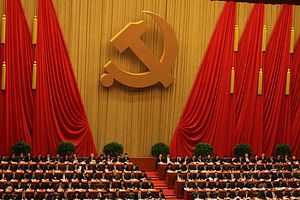On February 25, the Chinese Communist Party (CCP) Central Committee made public its proposal for amendments to the Chinese Constitution. The CCP had revealed earlier that it would be seeking to add Chinese President Xi Jinping’s political thought and the supervisory commissions into the constitution. However, the proposal contained a surprise as well: the CCP further proposed that the two-term limit for the presidency, together with the vice presidency, be removed, which potentially paves the way for Xi to remain in office as long as he wants.
Although the rumor that Xi intends to extend his term beyond the customary 10 years had spread at home and abroad for quite a while, the final announcement still deeply shocked many Chinese people. The potential amendment would be a significant political regression for Chinese politics; Financial Times quoted “one person with close ties to China’s leadership” as saying that it “has put us back 30 years.”
To be more exact, the change would put China’s constitutional reform process back 36 years. In 1982 — soon after Mao Zedong’s death and the Cultural Revolution — Deng Xiaoping had the two-term limit on the presidency and vice presidency inscribed in the state constitution. It was part of Deng’s plan to institutionalize leadership changes in China, to avoid a return to one-man rule.
There are two other equally significant, if less astonishing, proposed changes to the constitution.
First, one sentence stressing the CCP’s leadership — “The leadership of the Communist Party of China is the defining feature of socialism with Chinese characteristics” — was proposed to be added into Chapter 1, Article 1 of the constitution.
The CCP used to emphasized its own contribution to the victory in China’s New-Democratic Revolution in the constitution’s Preamble. The new wording would directly claim CCP leadership as “the defining feature” of the Chinese system in the constitution’s main chapter.
The other notable change involves the newly formed supervisory commissions, which are intend to further China’s anti-corruption efforts. The proposal said that “The supervisory commissions will independently exercise their power of supervision and not be subject to interference by any administrative organ, public organization or individual.” Many legal experts fear that the supervisory commissions will be granted too much power over the state.
After the proposed amendments were made public, numerous Chinese people expressed their astonishment, discontent, and even distress through social media. Many said on Weibo and WeChat that they had a sleepless night after reading the news and couldn’t help but cry for China’s future.
However, such comments online were wiped out instantly. China’s censors have implemented the strictest measures to prevent Chinese netizens from discussing these significant political developments. A large number of personal social media accounts have been either completely deleted or temporarily banned from posting any content, without any explanation. Many Chinese netizens thus had to use a VPN to log onto Twitter — which is banned in China — to vent their frustration and anger.
In addition, Baidu Index (the Chinese equivalent of Google Trend) showed that at 17:00 on February 25 — hours after the proposal was released — Chinese internet searches on “immigration” reached an unusual high peak. Now Baidu Index no longer provides data on the keyword “immigration.”
Meanwhile, China’s propaganda machine has harnessed its full power to defend the CCP’s decision. For example, the People’s Daily on February 25 used its entire front page to attack Western democracy, claiming that the electoral system and competition between different parties can’t guarantee the quality of top leaders. The Global Times published a pro-government editorial on the same day, saying, “Out of rationality and faith, all Chinese people support the [constitutional] amendment and hope it can contribute to our well-being.”
One Chinese legal professional, who wishes to remain anonymous, told The Diplomat that the CCP’s proposed amendments will almost certainly be passed by the National People’s Congress — China’s legislative branch — in March, since the NPC is under the Party’s full control.
According to China’s constitution:
Amendments to the Constitution are to be proposed by the Standing Committee of the National People’s Congress or by more than one-fifth of the deputies of the National People’s Congress and adopted by a vote of more than two-thirds of all the deputies to the Congress.
It’s impossible that one-third of all the NPC deputies would vote against this proposal, considering that there are nearly 3,000 deputies in the National Congress, the professional said.
However, this professional pointed out that the possibility remains that the Standing Committee might slightly revise the current proposal — for example, “to add a three-term limit for the presidency” — under pressure from public opinion.
“Different factions within the top leadership might have been and still are fiercely debating the amendment. And the losing faction now needs the power of the public,” the professional said.

































